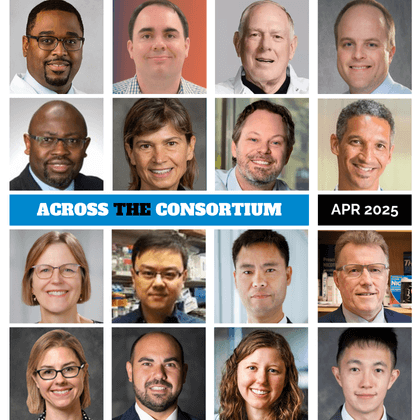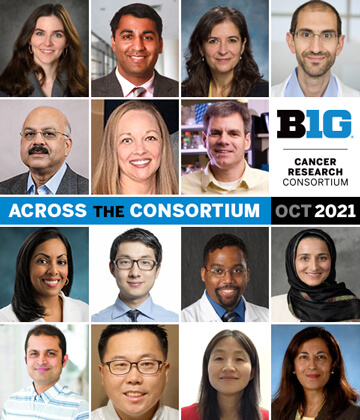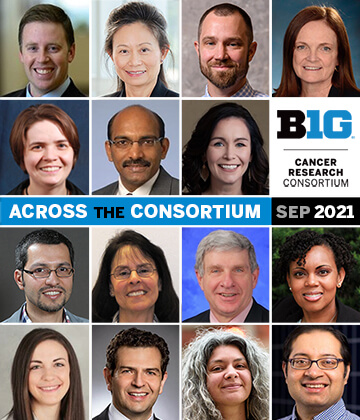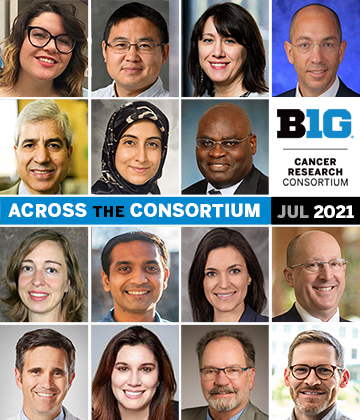August 26, 2021:
 In this month’s Across the Consortium, cancer investigators, program managers, and administrators share their progress in oncology research and maintaining their excellent standing through NCI-designation and association accreditation. Learn about new tools that may help identify patients who are at high risk of cancer progression and relapse, as well as promising pre-clinical results to treat human estrogen-receptor positive breast cancer and their metastases in bone, brain, liver, and lungs. Also, find out which of our Big Ten Cancer Research Consortium members increased clinical trial enrollment by 167 percent, and minority participation in clinical trials to 56 percent of total enrollment. Read on to discover what’s new across the Big Ten Cancer Research Consortium.
In this month’s Across the Consortium, cancer investigators, program managers, and administrators share their progress in oncology research and maintaining their excellent standing through NCI-designation and association accreditation. Learn about new tools that may help identify patients who are at high risk of cancer progression and relapse, as well as promising pre-clinical results to treat human estrogen-receptor positive breast cancer and their metastases in bone, brain, liver, and lungs. Also, find out which of our Big Ten Cancer Research Consortium members increased clinical trial enrollment by 167 percent, and minority participation in clinical trials to 56 percent of total enrollment. Read on to discover what’s new across the Big Ten Cancer Research Consortium.
Read More






 In this month’s Across the Consortium, the Big Ten Cancer Research Consortium highlights several investigators involved in detecting, decoding, and understanding genetic abnormalities as well as a potential drug target for treating aggressive pancreatic cancer and a tumor cell that may potentially stop tumor cell seeding and block cancer progression in breast cancer. We also feature a married couple at Penn State Cancer Institute that are building a research program using the MRIdian LINAC by Viewray, a Magnetic Res Magnetic Resonance Imaging (MRI)-guided linear accelerator, one of only 18 units currently open in the U.S. Learn about recent appointments, news grants, and more across our member institutions.
In this month’s Across the Consortium, the Big Ten Cancer Research Consortium highlights several investigators involved in detecting, decoding, and understanding genetic abnormalities as well as a potential drug target for treating aggressive pancreatic cancer and a tumor cell that may potentially stop tumor cell seeding and block cancer progression in breast cancer. We also feature a married couple at Penn State Cancer Institute that are building a research program using the MRIdian LINAC by Viewray, a Magnetic Res Magnetic Resonance Imaging (MRI)-guided linear accelerator, one of only 18 units currently open in the U.S. Learn about recent appointments, news grants, and more across our member institutions. In this month’s Across the Consortium, we share exciting innovations developed by cancer researchers at our member institutions, including a wearable temperature sensor that can detect dangerous complications in hospitalized cancer patients and new dual-mechanism estrogen receptor inhibitors that could support the treatment of estrogen receptor-positive and metastatic breast cancers. We also share recent appointments and publications highlighting faculty at member institutions. See what’s new in this issue of Across the Consortium.
In this month’s Across the Consortium, we share exciting innovations developed by cancer researchers at our member institutions, including a wearable temperature sensor that can detect dangerous complications in hospitalized cancer patients and new dual-mechanism estrogen receptor inhibitors that could support the treatment of estrogen receptor-positive and metastatic breast cancers. We also share recent appointments and publications highlighting faculty at member institutions. See what’s new in this issue of Across the Consortium. In this month’s Across the Consortium, cancer investigators, program managers, and administrators share their progress in oncology research and maintaining their excellent standing through NCI-designation and association accreditation. Learn about new tools that may help identify patients who are at high risk of cancer progression and relapse, as well as promising pre-clinical results to treat human estrogen-receptor positive breast cancer and their metastases in bone, brain, liver, and lungs. Also, find out which of our Big Ten Cancer Research Consortium members increased clinical trial enrollment by 167 percent, and minority participation in clinical trials to 56 percent of total enrollment. Read on to discover what’s new across the Big Ten Cancer Research Consortium.
In this month’s Across the Consortium, cancer investigators, program managers, and administrators share their progress in oncology research and maintaining their excellent standing through NCI-designation and association accreditation. Learn about new tools that may help identify patients who are at high risk of cancer progression and relapse, as well as promising pre-clinical results to treat human estrogen-receptor positive breast cancer and their metastases in bone, brain, liver, and lungs. Also, find out which of our Big Ten Cancer Research Consortium members increased clinical trial enrollment by 167 percent, and minority participation in clinical trials to 56 percent of total enrollment. Read on to discover what’s new across the Big Ten Cancer Research Consortium. In this month’s Across the Consortium, get to know some the cancer investigators in the Big Ten, what doctoral candidates and graduate students are researching, what publications and accolades have been shared with Big Ten researchers, and more.
In this month’s Across the Consortium, get to know some the cancer investigators in the Big Ten, what doctoral candidates and graduate students are researching, what publications and accolades have been shared with Big Ten researchers, and more.













Subscribe to the Big Ten CRC Newsletter X
X Facebook
Facebook YouTube
YouTube